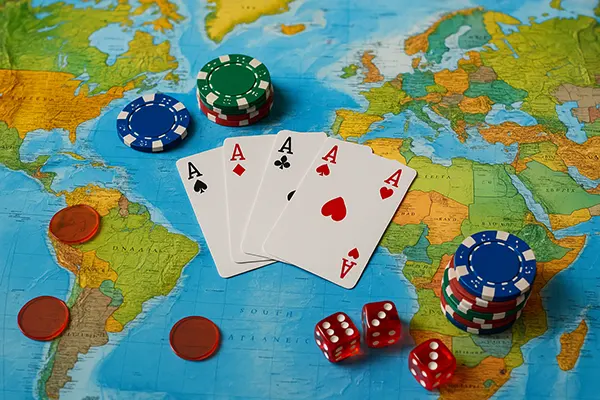
Poker in Emerging Markets: New Regions, New Players, New Challenges
While poker remains a staple in established regions like North America and Europe, recent trends show that developing countries across Africa, Southeast Asia, and Latin America are becoming fertile grounds for the game’s next chapter. The reasons behind this surge are deeply rooted in shifting social norms, improving digital access, and a desire for both intellectual stimulation and economic opportunity. As these new players emerge, so too do a host of challenges and possibilities for the global poker scene.
Socio-Cultural Growth of Poker in New Regions
Poker is experiencing an unexpected renaissance far from its traditional hubs. In countries such as Nigeria, Vietnam, and Brazil, the game is swiftly gaining popularity, not as a luxury pastime but as a socially engaging form of competition and skill-building. The appeal goes beyond simple entertainment—poker is becoming a tool for networking, critical thinking, and even financial aspiration in communities where such opportunities are highly sought.
In Nigeria, poker has started to develop within urban youth circles, particularly in Lagos and Abuja. Young professionals see the game not only as a mental challenge but also as a means of building strategic thinking skills relevant to their daily lives. In Vietnam, poker’s rise is linked closely with tourism and expatriate culture. As more foreign-run clubs establish roots, they also attract local players interested in the strategic depth of the game.
In Latin America, particularly in Brazil and Colombia, poker has long enjoyed a niche presence. What’s changing now is the broadening of this base thanks to the influence of local poker ambassadors and improved accessibility through organised events. Poker is becoming a symbol of intelligence and community, especially among young adults seeking more interactive and intellectually stimulating leisure activities.
Changing Perceptions and Social Influence
In emerging markets, poker is shedding its association with chance and gambling, and is instead seen increasingly as a game of skill. This shift is largely driven by education efforts, local tournaments, and social media influencers who focus on the analytical and psychological dimensions of the game. Such changes are crucial in transforming the image of poker in conservative or traditional societies.
Furthermore, the visibility of professional players from developing nations, including finalists in international tournaments, helps validate poker as a respectable pursuit. Their stories resonate strongly with young audiences who aspire to compete and succeed globally. This narrative of meritocracy—where strategy and patience outweigh luck—has become central to poker’s new image.
As poker continues to grow in these regions, it increasingly intersects with local cultures and values. In some cases, it blends with traditional games or rituals. In others, it emerges as a subculture in urban nightlife. The game is becoming more embedded in the everyday lives of its new communities.
Structural Barriers and Legal Complexities
Despite its growing appeal, poker in developing regions still faces serious hurdles. One of the primary challenges is infrastructure. Many countries lack dedicated poker rooms or professionally run clubs, forcing players into informal or underground settings. This affects not only the experience but also the safety and reliability of the environment for competitive play.
Another critical barrier is the lack of standardised legal frameworks. In many jurisdictions, poker exists in a grey area where it is neither fully legal nor outright banned. This creates uncertainty for organisers, investors, and players alike. Countries like Thailand and Nigeria have strict regulations against gambling, making it difficult for poker to gain legitimacy even as a skill-based game.
Payment systems and accessibility to international platforms also present a major obstacle. In regions with limited access to secure digital payments, players find it difficult to participate in global online tournaments or deposit and withdraw funds safely. This hampers the scalability of poker and discourages long-term commitment from local communities.
Efforts to Build Sustainable Ecosystems
To address these issues, some grassroots organisations and poker advocates are working on localised solutions. In Latin America, player unions and community clubs are advocating for clearer laws distinguishing poker from games of chance. In Vietnam, some establishments work closely with authorities to operate legally within loopholes, creating safer and more transparent environments.
Additionally, fintech development in Africa is helping to bridge the gap in payments. Services like Flutterwave and Paystack are being explored as potential enablers for more secure transactions in the poker economy. Meanwhile, mobile technology growth is making it easier for even rural players to access information, training, and networks.
International bodies such as the Global Poker Index and regional federations are also beginning to take notice. Their involvement in regulation, sponsorship, and tournament organisation could mark the beginning of a more stable poker industry in developing economies.

Opportunities for Brands and Tournament Series
For poker operators and tournament organisers, these emerging regions represent untapped potential. The enthusiasm among new players, coupled with relatively low market saturation, offers a unique opportunity to create tailored experiences that resonate culturally and socially. From language-specific events to local celebrity partnerships, the scope for growth is significant.
Major brands that have succeeded globally are beginning to explore new entries into countries like Brazil, Kenya, and the Philippines. However, success will require more than just translation or promotion. It demands deep cultural integration and an understanding of the regulatory environments. Brands that invest in community-building and education are more likely to thrive in the long term.
Furthermore, digital-first initiatives such as regional poker leagues, mobile-exclusive tournaments, and e-learning tools could become critical tools for engagement. These allow new players to ease into the game without the pressure or stigma that may accompany traditional venues, while also helping to scale player bases organically.
What the Future Holds for Global Poker
The poker boom in developing nations is not a fleeting trend but a fundamental shift in the global gaming landscape. As younger generations seek competitive and mentally enriching forms of entertainment, poker stands out as a viable and respected option. With proper support, this new wave of players could reshape the competitive poker ecosystem within the next decade.
Still, real growth will require cooperation across public and private sectors. Governments must distinguish poker from chance-based gambling, while brands and local operators should focus on infrastructure, safety, and player development. Only through this collaboration can the full potential of these new markets be realised.
In essence, the future of poker might not lie in Las Vegas or Monte Carlo, but in the buzzing districts of Lagos, the vibrant streets of São Paulo, or the tech hubs of Ho Chi Minh City. These places are no longer the fringe—they are becoming the new heart of poker.






